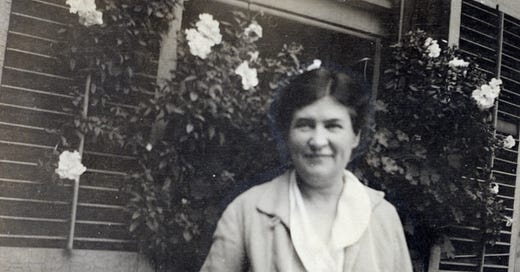A Great Writer, Not a Great Woman Writer
Willa Cather dared to depict goodness without sneering

This missive is a mash note for a story I hope you’ll read – or reread. But first, disentanglement from the bewilderment of labels and the fascism of fashion.
For devotees of beauty, tastes tend to form in early post-pubescence, our swooning years. When I was in college (1969-1973), a “woman writer” was deemed inferior to the manly sort, popularity with readers an embarrassment, and homosexuality a disease. A yen for Willa Cather was, thus, a weakness to be blushed at, like one for Twinkies, no academic credential. Since then, women’s and gay studies have graduated into scholarly subspecialties. Popularity grows less culpable if it survives generations. Insensibly, Cather has ascended Parnassus, where she joins Jane Austen, the Bronte sisters, George Eliot, Emily Dickinson, Virginia Woolf as great – not great women – writers.
Modernism recoiled from limpid diction. You could boast about reading Pound’s Cantos or Finnegans Wake, even if you’d loathed the effort. Cather’s My Antonia or Death Comes to the Archbishop were enjoyed by schoolgirls! Amiable writing couldn’t be “serious”.
A signal blessing of retirement is freedom to decide for oneself. I favor prose that goes down easily and doesn’t get in my way, that seeks to comfort and console, not daunt and dazzle. If it gets fancy, it’s with a conspiratorial wink not sniffy disdain.
Willa Cather wrote because she had something urgent to convey. She loved her protagonists and wanted us to love them too, to love life better for knowing them, and to improve our own lives by their example. She dared to depict goodness without sneering. Her style was the humble servant of this mission. She wanted to be readable, not quotable, so we could look through her words onto her scene as through a spotless window.
While her every syllable tells, no sentence shouts. Unlike Hemingway, who flaunts his austerity of utterance, Cather’s natural cadences seek to avoid our notice. She chastens my ostentation. I write to impress – I can’t help it. Cather sighs at my insecurity.
Her story, “Neighbor Rosicky,” which I just met in an anthology, is a masterpiece of understatement. It introduces us to a happy middling farmer in the American Midwest, a poor Bohemian by birth, who brims with gratitude for his American opportunity. He loves his wife, kids, farm, friends, even his hardships. He is glad to have lived and will die with a smile. Like Antaeus (or Thoreau), he draws his strength and quiet from the soil. City life, in his view, sickens, weakens, saddens. Every one and thing Rosicky encounters glows golden in the light of his love as from a flickering fire.
The story follows Rosicky from a diagnosis – by his beloved doc – of heart disease to his expected death. The one (mild) dissonance in his life arises from misunderstanding, not malice, and is harmonized by understanding. You can’t help loving Neighbor Kosicky or the writer who made him. What balm in this fractious vicious hour, when goodness is mocked as a sick joke.
And the goodness is real, convincing, not syrupy sentimentality or wishful thinking. Listen:
Sometimes the Doctor heard the gossipers in the drug-store wondering why Kosicky didn’t get on faster. He was industrious, and so were his boys, but they were rather free and easy, weren’t pushers, and they didn’t always show good judgment. They were comfortable, they were out of debt, but they didn’t get much ahead. Maybe, Doctor Burleigh reflected, people as generous and warm-hearted and affectionate as the Rosickys never got ahead much; maybe you couldn’t enjoy your life and put it in the bank too.
Be still, my heart.




Thanks, Carll, for the dose of common sense...